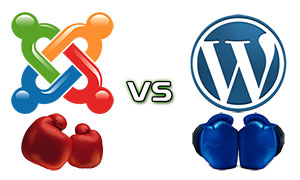Joomla vs WordPress Round 2 – Joomla
 Joomla! – The Pros & Cons
Joomla! – The Pros & Cons
First, we are going to look at Joomla! and discover the options and attributes that may make this the CMS choice for you. Joomla! is a free and open source content management system (CMS) for publishing content on the World Wide Web.
Joomla! is written in PHP, and uses object-oriented programming (OOP) techniques which is stored in a MySQL database, and includes features such as page caching, RSS feeds, printable versions of pages, news flashes, blogs, polls, search, and also supports many languages.
Between March 2007 and February 2011, there have been more than 21 million downloads, with over 7,400 free and commercial extensions available from the official Joomla! Extension Directory and even more available from private companies!
The Pros
Larger User Base – Joomla! originated in England and Joomla! is used by many countries around the world. Therefore, it is widely recognized as being the one of the most widely used Open Source projects in the world.
More Levels of Extensions – Joomla! works at three levels of Extensions, as opposed to the two levels of WordPress.
- Components – At the top level, components can add new Applications at the menu level. This is Joomla!’s major power over WordPress. For example, a menu link can go to a calendar application without having to be plugged into an article or become a module/widget on the side. The component capability allows for many extensive web applications to go into a website on their own existing webpages, which is extremely powerful for a large website.
- Modules – The equivalent to Widgets in WordPress, modules in Joomla! are great for adding links/apps/forms to sidebars, footers, and headers. Modules are pretty much little standalone programs, that usually (but not always) draw their information from the larger and more extensive components. With WordPress, there is not a components level, so all configuring has to be done at the widget level, which can become redundant. With Joomla!, the user can have many modules drawing from one component, which allows for mostly central configuring. Keep in mind, that Joomla! allows you to publish modules/widgets on any or all pages that you choose, whereas WordPress uses an all pages or none strategy.
- Plug-ins – Plug-ins are little pieces of software that allow you to add more dynamic content within an article/post on your website (video, slideshow, search bar, etc). Both Joomla! and WordPress have these, so Joomla! has no advantage here.
Multiple Templates – New to Joomla! 1.6 is the ability to have multiple templates (themes in WP) on a single website. This is great for allowing different area of the website to have its own look and feel, without having to install a separate instance. WordPress does not have this capability.
Access Control – Joomla! 1.6 allows access control for templates, modules, components, pages, menus, and pretty much everything else. Users can be put into as many groups as required and each group can be given its own set of very specific permissions. WordPress has a few default user groups (roles), but there are only five roles with pre determined permissions.
The Cons
More Complicated – Because of the advanced functionality Joomla! contains, getting a website up quickly becomes more of a task that grows with each website add-on. Menu items have to be added manually which can become a pain. Permissions have so many options that the administrators need to know what they are doing, so as not to leave things to chance.
Not indigenous to North America – Currently, as this article is being written, Joomla! 1.6 does not have a US English language pack. On client’s websites, the English GB (Great Britain) language pack has to be hacked and all the settings and locations to the U.S. must be changed. Why is this important? Search engines like Google are now trying to base their search results locally, especially after the Google Panda Algorithm update. So, having a location in Europe does not help the website’s search engine rankings at all.
Comments Component not Included – Unlike WordPress, Joomla! does not come with a comment component included in the basic package. A component such as JComments is required to add the comment functionality to the site, and even that component currently doesn’t work with the latest version of Joomla!.
Basic Editor – Joomla! comes with the basic TinyMCE editor. This editor is not as advanced or user friendly as the WordPress editor. A great editor like JCE Editor is recommended for advanced article layout and formatting.
If you are looking for a highly adaptable, widely used CMS system with a very secure, controlling client access control component, then Joomla! IS the choice for you. Let’s not forget, you can have very independent looking sections of your website with different templates and different groups accessing those different sections.
This round goes to Joomla! If you are wondering how WordPress stacks up against Joomla!, come back tomorrow for…




